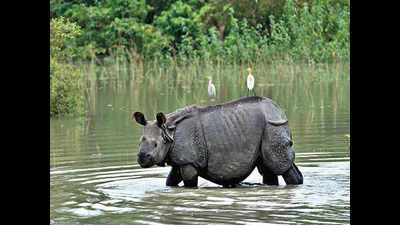- News
- City News
- guwahati News
- Poaching of rhinos drops significantly at Kaziranga
Trending
This story is from July 4, 2019
Poaching of rhinos drops significantly at Kaziranga
Days after the elephant count in Kaziranga National Park (KNP) went up, more happy news keeps coming in for the world heritage site. The national park has recorded a significant drop in the number of rhinos that have been poached since 2017.

An 82-member Special Rhino Protection Force has been deployed to stop poaching

"The threat of poaching surely exists. Poachers continuously look for opportunities to sneak into the the park to kill a rhino. It is because of our anti-poaching drives and intelligence gathering mechanisms that the poaching that the poaching rate has come down," a senior KNP official said.
Located on the flood plains of Brahmaputra, large swathe of Kaziranga remain inundated every monsoon. This is the time when rhinos become most vulnerable to poaching. In order to keep a check on this and further bring down the number of rhinos killed, 82 constables of the first-ever batch of a Special Rhino Protection Force (SRPF) have been deployed in the national park. This special force, which consists of 74 men and eight women, has the sole objective of protecting the one-horned rhino. This was the first time that a dedicated force was raised to keep a check on rhino poaching and related activities in Kaziranga. In the years leading up to 2013, there was rampant rhino poaching. 2013 and 2014 saw 27 poaching incidents each year (the highest in the last decade).
According to KNP records, between 2017 and 2018 seven rhinos were poached and during 2018 and 2019, only six rhinos were killed. In the current year (2019-20) one rhino has been poached so far. This, when compared to the 12 rhinos killed in 2016, is a very significant drop.
"It is a joint effort of forest department and police along with the support of local people that we could bring down the incidents of poaching in Kaziranga. Local people have been of great help as their support is very crucial to stop poachers from entering the national park," Rohini Ballav Saikia, Kaziranga divisional forest officer, said.
A 2018 state forest department census done across the 430-square-kilometer park counted 2,413 rhinos - which reflected an increase of 12 individuals since 2015 census. According to figures, there are 2,547 rhinos in Assam: 34 in Manas National Park and 100 in Orang National Park.
End of Article
FOLLOW US ON SOCIAL MEDIA










